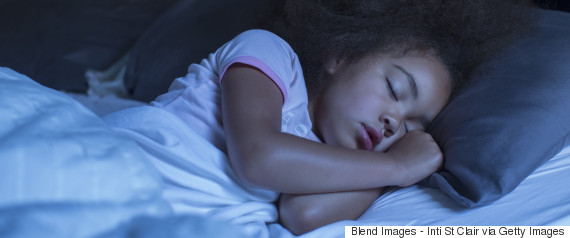http://i.huffpost.com/gen/2707878/thumbs/r-ALARM-CLOCK-AT-NIGHT-large570.jpg I woke up in the middle of the night one night last year, and my boyfriend was missing from his side of the bed. I fell back asleep, assuming he was just in the bathroom. A couple hours later, his side was still empty. I looked in the bathroom -- no one there. I checked the kitchen. Nothing.
The only room left to check in the apartment was my roommate's. She was gone for the night, so I peeked in. Sure enough, there he was, curled up in the fetal position in her bed.
"What are you doing?" I asked.
"What do you mean what I'm doing?" He seemed confused (and irritated) as to why I was waking him up. He quickly came to his senses and realized he wasn't in the right room -- or bed -- and had no recollection of getting there.
Sleepwalking is a type of parasomnia, a group of "behaviors that occur in sleep that we typically wouldn't expect," said Dr. Charlene Gamaldo, medical director of the Johns Hopkins Center for Sleep and fellow of the American Academy of Sleep Medicine. It falls in the same category as sleep talking, sleep eating and other unexpected actions during sleep.
In fact, said Gamaldo, we may not even know everything that's going on while we sleep. But based on what the experts do understand, here are some surprising facts about sleepwalking.

1. The time of night the sleepwalking occurs can tell you a lot.
Someone who sleepwalks shortly after falling asleep is experiencing a totally different stage of sleep than someone who shows similar behaviors later on in the night. Classic sleepwalking usually occurs within the first third of the night when a person is in non-REM (often dreamless) sleep, Gamaldo told The Huffington Post.
My boyfriend sleepwalks within the first couple of hours of going to sleep, often waking from it in the middle of the night. He’s woken up in the wrong bed, sitting straight up on the couch or even one time wandering outside his friend’s dorm room in the rain.
It's important to distinguish what part of the night such sleep behaviors take place because if they happen later on in the night during REM sleep, it's not called sleepwalking. Instead it's considered REM behavior disorder (RBD), in which the person is often acting out dreams.
While sleepwalking is otherwise harmless (especially if the person is kept safe), RBD can be the first sign of neurodegenerative disorders like Parkinson's disease or Lewy body dementia.
2. The sleepwalker often has no memory of what happened.
Non-REM stage sleepwalkers typically do not recall what happened the next day, Gamaldo said. And yes, this goes for even the most elaborate sleepwalking actions.
Catherine Losurdo, 24, who has been sleepwalking since she was a teenager, said she left her hotel room in the middle of the night when she was visiting Spain.
"I had apparently walked outside our hotel in downtown Barcelona in my pajama shorts and a tank top, walked back into the hotel, talked to the hotel worker in Spanish and asked him to call my room," she told HuffPost. "I walked back up about 10 flights of stairs to the room and don't remember a thing. My mom had to tell me in the morning.”
Interestingly, those who have abnormal behavior during REM sleep are more likely to recall what is going on in their dreams and are often able to explain why they were acting in a particular way.
3. The sleepwalker’s eyes are usually open.
Sleepwalkers in the non-REM stage often have their eyes open, though they may look glazed over or only half awake.
"I was told it was hard to tell when I was actually sleepwalking because my eyes were open, and I would have conversations with people," said Losurdo.
Those who are acting out their dreams in REM sleep generally have their eyes closed.
4. You should not wake up a sleepwalker. But you should guide them.
You may have heard the advice to never wake up a sleepwalker. And there is some truth to this.
"They are confused and don't have their bearings," said Gamaldo. "They're potentially very agitated and aggressive."
The best thing you can do is gently guide them back to bed. "The biggest thing is you just want to make sure that they're safe," she said.

5. Anything that disrupts sleep can trigger sleepwalking.
My boyfriend says he's noticed he sleepwalks when he's extremely tired, if he's had alcohol or if there's something unsettling he's thinking about before bed. Indeed, said Gamaldo, anything that causes you to wake up more easily can also lead to sleepwalking, like an unfamiliar environment, an uncomfortable room, sleep deprivation, sickness, stress and alcohol. Sleepwalking can run in families, though, and is more common in children.
6. There are ways you can prevent sleepwalking.
If you sleepwalk, make sure you're getting enough sleep and optimal sleep quality. "Adopt a sleep-healthy lifestyle and pattern," said Gamaldo.
That includes sleeping in a cool, dark room with no TV or bright lights. Avoid spicy foods or heavy meals right before bed, which can lead to sleep-disrupting heartburn. Avoid alcohol, because although it may help you fall asleep faster initially, it will make you more likely to wake up later on.
Lastly, eliminate stress as much as possible by allowing yourself to decompress and relax before bed.
Do you sleepwalk? We'd love to hear from you! Email us at healthyliving@huffingtonpost.com.
from http://www.huffingtonpost.com/healthy-living/
The only room left to check in the apartment was my roommate's. She was gone for the night, so I peeked in. Sure enough, there he was, curled up in the fetal position in her bed.
"What are you doing?" I asked.
"What do you mean what I'm doing?" He seemed confused (and irritated) as to why I was waking him up. He quickly came to his senses and realized he wasn't in the right room -- or bed -- and had no recollection of getting there.
Sleepwalking is a type of parasomnia, a group of "behaviors that occur in sleep that we typically wouldn't expect," said Dr. Charlene Gamaldo, medical director of the Johns Hopkins Center for Sleep and fellow of the American Academy of Sleep Medicine. It falls in the same category as sleep talking, sleep eating and other unexpected actions during sleep.
In fact, said Gamaldo, we may not even know everything that's going on while we sleep. But based on what the experts do understand, here are some surprising facts about sleepwalking.

1. The time of night the sleepwalking occurs can tell you a lot.
Someone who sleepwalks shortly after falling asleep is experiencing a totally different stage of sleep than someone who shows similar behaviors later on in the night. Classic sleepwalking usually occurs within the first third of the night when a person is in non-REM (often dreamless) sleep, Gamaldo told The Huffington Post.
My boyfriend sleepwalks within the first couple of hours of going to sleep, often waking from it in the middle of the night. He’s woken up in the wrong bed, sitting straight up on the couch or even one time wandering outside his friend’s dorm room in the rain.
It's important to distinguish what part of the night such sleep behaviors take place because if they happen later on in the night during REM sleep, it's not called sleepwalking. Instead it's considered REM behavior disorder (RBD), in which the person is often acting out dreams.
While sleepwalking is otherwise harmless (especially if the person is kept safe), RBD can be the first sign of neurodegenerative disorders like Parkinson's disease or Lewy body dementia.
2. The sleepwalker often has no memory of what happened.
Non-REM stage sleepwalkers typically do not recall what happened the next day, Gamaldo said. And yes, this goes for even the most elaborate sleepwalking actions.
Catherine Losurdo, 24, who has been sleepwalking since she was a teenager, said she left her hotel room in the middle of the night when she was visiting Spain.
"I had apparently walked outside our hotel in downtown Barcelona in my pajama shorts and a tank top, walked back into the hotel, talked to the hotel worker in Spanish and asked him to call my room," she told HuffPost. "I walked back up about 10 flights of stairs to the room and don't remember a thing. My mom had to tell me in the morning.”
Interestingly, those who have abnormal behavior during REM sleep are more likely to recall what is going on in their dreams and are often able to explain why they were acting in a particular way.
3. The sleepwalker’s eyes are usually open.
Sleepwalkers in the non-REM stage often have their eyes open, though they may look glazed over or only half awake.
"I was told it was hard to tell when I was actually sleepwalking because my eyes were open, and I would have conversations with people," said Losurdo.
Those who are acting out their dreams in REM sleep generally have their eyes closed.
4. You should not wake up a sleepwalker. But you should guide them.
You may have heard the advice to never wake up a sleepwalker. And there is some truth to this.
"They are confused and don't have their bearings," said Gamaldo. "They're potentially very agitated and aggressive."
The best thing you can do is gently guide them back to bed. "The biggest thing is you just want to make sure that they're safe," she said.

5. Anything that disrupts sleep can trigger sleepwalking.
My boyfriend says he's noticed he sleepwalks when he's extremely tired, if he's had alcohol or if there's something unsettling he's thinking about before bed. Indeed, said Gamaldo, anything that causes you to wake up more easily can also lead to sleepwalking, like an unfamiliar environment, an uncomfortable room, sleep deprivation, sickness, stress and alcohol. Sleepwalking can run in families, though, and is more common in children.
6. There are ways you can prevent sleepwalking.
If you sleepwalk, make sure you're getting enough sleep and optimal sleep quality. "Adopt a sleep-healthy lifestyle and pattern," said Gamaldo.
That includes sleeping in a cool, dark room with no TV or bright lights. Avoid spicy foods or heavy meals right before bed, which can lead to sleep-disrupting heartburn. Avoid alcohol, because although it may help you fall asleep faster initially, it will make you more likely to wake up later on.
Lastly, eliminate stress as much as possible by allowing yourself to decompress and relax before bed.
Do you sleepwalk? We'd love to hear from you! Email us at healthyliving@huffingtonpost.com.
from http://www.huffingtonpost.com/healthy-living/
No comments:
Post a Comment